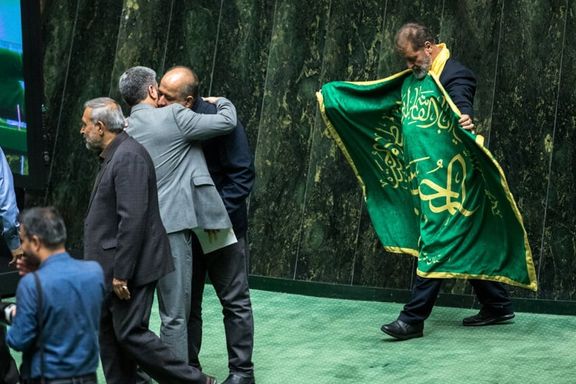Denial dominates Iran’s parliament, but sanctions toll hard to ignore

While Iran’s hardline-led parliament resounds with defiant statements dismissing the impact of new UN sanctions, a few lawmakers are beginning to admit the likely economic toll.

While Iran’s hardline-led parliament resounds with defiant statements dismissing the impact of new UN sanctions, a few lawmakers are beginning to admit the likely economic toll.
Independent MP Hamid Reza Goudarzi broke ranks on Wednesday, saying the so-called snapback of measures halted under the 2015 nuclear deal has “damaged Iran’s economy.”
His remarks drew sharp criticism from colleagues but resonated with many outside parliament who are struggling with higher prices and a collapsing currency.
The rial, which hovered around one million to the US dollar before the sanctions’ return, surged past 1,160,000 by midday Wednesday, a new low. Food and basic staples are increasingly out of reach.
Another moderate MP, Salman Eshaghi, lamented the strain on his constituents in eastern Iran: “People can no longer afford meat, chicken, rice and other staples,” he said, urging the judiciary to summon local and national officials over the price hikes.
But the dominant voices in the Majles remain combative.
‘They want riots’
Vahid Ahmadi, a member of the National Security and Foreign Relations Committee, dismissed the currency crash as a “psychological” effect.
“Nothing has happened as a result of the snapback,” he insisted. “The rise in exchange rates has no economic reason.”
Ahmadi argued that sanctions were simply a continuation of war by other means: “The 12-day war against Iran was intended to trigger regime change and national disintegration. Now that our enemies have failed and begged for a ceasefire, they aim to confront the Islamic Republic through snapback sanctions.”
Another senior MP Ahmad Rastineh echoed this line: “the snapback is designed to incite riots in Iran,” he asserted. “We seek the destruction of Israel, and we will continue to pursue that goal.”
Cracks in hardline narrative?
Hossein Ali Haji Deligani, notorious for his incendiary remarks, took it a step further.
“The European troika is a slave and servant of the United States,” he said. “It is not in Iran’s interest to remain in the 2015 nuclear deal or the Non-Proliferation Treaty.”
Many interpreted this as an open call to review Iran’s nuclear doctrine, edging toward weaponization.
Such hardline voices dominate Iran’s parliament, but cracks are widening as economic pressure intensifies.
Hossein Samsami, an MP for Tehran, tied rising prices directly to the collapsing exchange rate, contradicting colleagues who blamed foreign plots or “psychology.”
The fact that even conservative outlets like the Students News Network are publishing such remarks shows how far the looming crisis has pushed officials: denial still dominates, but moments of candor are breaking through.